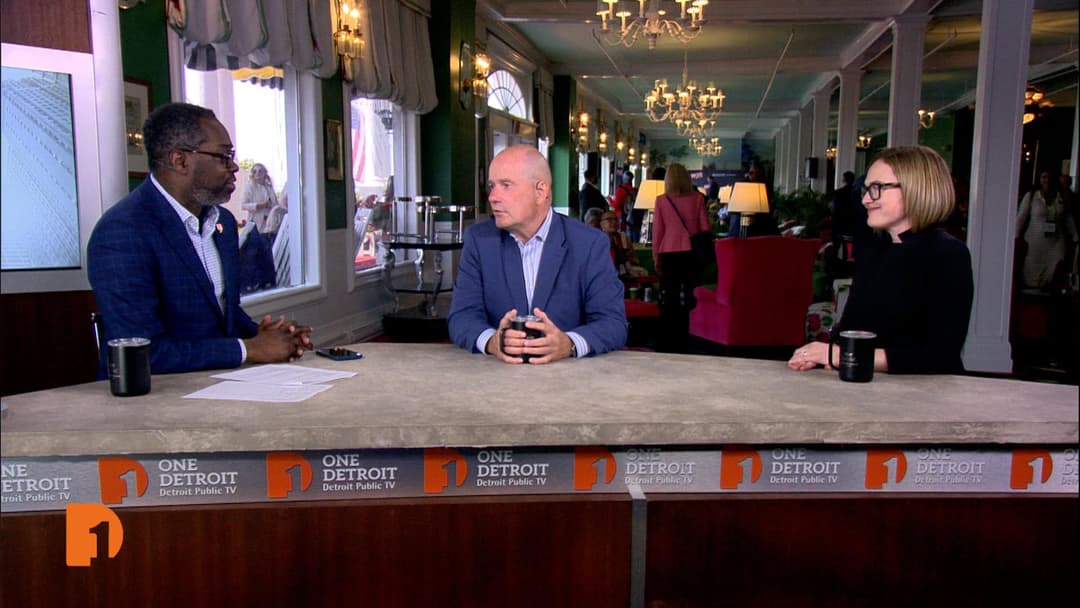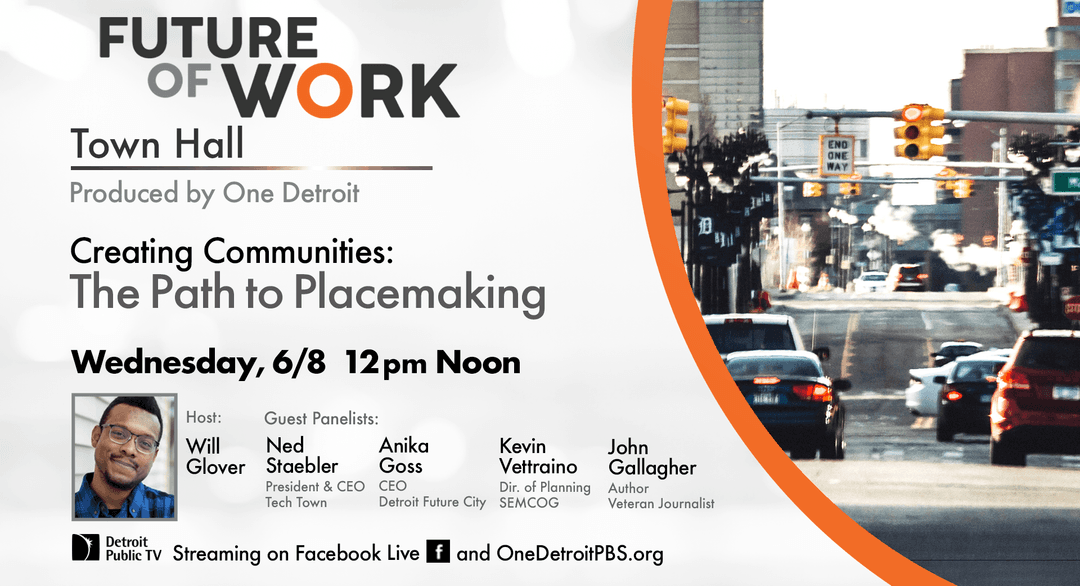Millennials make up a majority of the global workforce. Can Michigan attract them to move here?
Jan 19, 2023
Millennials are expected to make up nearly three-fourths of the global workforce in the next two years, and many are moving away from now-unaffordable and overpopulated cities like New York City and San Francisco to cities down South including Austin, Dallas, and Miami. As millennial workers consider where they want to plant their roots, and build a family and career, what can Michigan do to attract them to move here?
RELATED: Placemaking: The Path to Increasing Quality of Life, Talent Attraction in Michigan
It could be Michigan’s affordability, especially housing affordability, and accessibility that motivates millennials to move to Southeast Michigan, Detroit Regional Chamber Senior Director of Community Engagement and Learning Development Devon O’Reilly says. One Detroit Producer, and Future of Work host, Will Glover met with O’Reilly at the Chamber’s downtown Detroit offices to talk about strategies that could make Michigan more attractive to millennial workers.
Full Transcript:
Will Glover, One Detroit, Host: Our focus, my focus is the future of work. And one of the things that people are concerned about is where the millennials are going because they have the talent that every municipality, every state, every city wants to bolster their economy. But reports are saying millennials, our cohort are moving down south. They’re going to Dallas, they’re going to Austin, they’re going to Florida. What do you think it takes to get them to come here? Why aren’t they flocking to Detroit or Southeast Michigan? And what is the solution in your eyes to change that?
Devon O’Reilly, Senior Director, Community Engagement and Leadership Development Detroit Regional Chamber: Sure. I mean, well we can’t change the weather so, you know, there’s that migration to southern warmer states and warmer climates. Nothing we can do about that, although I’d argue having four seasons is pretty cool. I mean, I enjoy having four great seasons in Michigan. So we have some things that we have to look at in terms of what are our strengths. There’s things we can’t change. There’s certain factors, whether it be environmental, whether it be major macro factors that we can’t really change anytime soon. So we have to look at what our strengths are.
There is still a good amount of affordability compared to some of the places. You mentioned, even if you look at like Austin, D.C.. Even in the coasts, Boston. It’s it’s really expensive. And especially at housing, which people are talking about the housing market and being able to afford and the dream of millennial is to own a home just like anyone in previous generations. And that’s still really a lot more attainable here in the southeast Michigan region. And so there is a level of kind of accessibility and affordability that I think is important to consider when staying in Michigan. I have friends in other parts of the country who just can’t afford a house.
And money goes a long way here, longer way here, I should say. So that’s a factor. But I think we also have to look at it strategically. And, you know, we are and when I say we, I’m talking about kind of the chamber, our partners. And actually what I’m encouraged by is some of the real intentionality about how can we address this problem. So, for instance, at our Machado summit in December, the governor announced a fund, funding for our Machado program for a high-tech talent strategy. And what that’s going to be doing is going to allow public and private sectors. So academic institutions, schools themselves, employers, major employers here and places like the chamber to kind of work together on benchmarking. Well, what are other cities doing that are attracting talent? Where are they going?
Because we have talent here. We know this. We have talent here. We have some of the best schools in the country, in the world here. They’re just leaving. And so it’s more about how are we keeping people here who already know about Michigan and maybe just change their perception a little bit and show them a pathway. And so, what we’re going to start talking about is this kind of career talent supply chain, instead of a pipeline. A talent supply chain where there’s, on ramps off ramps. But there’s a strategic way where if you’re in school, if you’re at Michigan Tech or you’re in Lawrence Tech or you’re at U of M, you have a clear path to a really great career in a field that you want because, again, jobs are here.
And so a lot of it, unfortunately, is just perception and changing that perception and showing people, young people in high school and in college, that there is a clear path to an incredible job that will pay you well and give you that life that you want. And then you can vacation in Florida and Southern California and have another house there.
Will Glover: Right, right. So, we can set you up here to have the life that you want and explore the world.
Devon O’Reilly: Exactly.
Will Glover: Right. Could you give… Give us your pitch for coming to the city of Detroit. For starting your business here, growing your business here, starting your family here, growing your family here. Living, working, playing. What is your pitch for anybody who might not quite get it yet?
Devon O’Reilly: I can tell you because I live it every day. And you know this you know, we talked about that small-town feel. Well, that’s helpful in that regard because if you want to make something of yourself here, whether it be starting your own business, whether it be part of a larger business that you feel is doing something really great, worthwhile. You can do it here easier and more accessible because everyone talks to each other. You can be in Detroit for a week and find all the right people. You find Devon, I introduce you to Will, Will introduces you to Jeanette Pearson or whoever it is, whoever you want to talk to. That’s what kind of my personal pitch to people.
When I talk to small businesses and I talk to entrepreneurs and I have from all over the world, you know, I tell them in a nutshell, who do you need to talk to? We can connect you. I can connect you because that’s what Detroit does.We all know each other and we all have these relationships. So you can do it here. You can build it here, whatever that is to you. You can build it here.
Stay Connected:
Subscribe to One Detroit’s YouTube Channel & Don’t miss One Detroit Mondays and Thursdays at 7:30 p.m. on Detroit PBS, WTVS-Channel 56.
Catch the daily conversations on our website, Facebook, Twitter @DPTVOneDetroit, and Instagram @One.Detroit
View Past Episodes >
Watch One Detroit every Monday and Thursday at 7:30 p.m. ET on Detroit Public TV on Detroit Public TV, WTVS-Channel 56.
Stay Connected
Subscribe to One Detroit’s YouTube Channel and don’t miss One Detroit on Thursdays at 7:30 p.m. and Sundays at 9 a.m. on Detroit PBS, WTVS-Channel 56.
Catch the daily conversations on our website, Facebook, Twitter @OneDetroit_PBS, and Instagram @One.Detroit
Related Posts
Leave a Reply
Your email address will not be published. Required fields are marked*




























